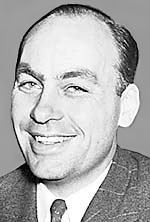George Gallup
George Horace Gallup (born November 18, 1901 in Jefferson (Iowa) , † July 26, 1984 in Tschingel ob Gunten , Switzerland) was an American pioneer of market and opinion research . He came from the field of journalism and advertising before he turned to market research - and specifically to political opinion research. He was the first to use probability theory to conduct representative surveys on a scientific basis .
The most cited anecdote that established Gallup's reputation takes place in the US presidential election of 1936, when The Literary Digest magazine interviewed millions of Americans through written surveys . Based on the replies that came back, a victory for Landon over Roosevelt was predicted. George Gallup drew a representative sample (2000 face-to-face interviews per week) and correctly predicted Roosevelt's victory over Landon. In a letter to the editor, even before the poll results became known, he predicted that Literary Digest would undoubtedly falsely announce Landon as the winner. He was right.
The reason for the wrong prognosis was a selection error in the sample : In the case of the written survey, the results depend on who decides to take part. In addition, Literary Digest had sent the questionnaires to people who were registered as phone or car owners. Shortly after the economic crisis, only privileged groups of voters owned such luxury goods. This first “coup” made the term “Gallup Survey” a synonym for exact opinion polls on a scientific, statistical basis.
He then founded the Gallup International Association , one of the world's leading market and opinion research institutes to this day.
In 1975 Gallup was elected to the American Academy of Arts and Sciences .
literature
- Hadley Cantril: Gauging Public Opinion (1944)
- Hadley Cantril, Mildred Strunk (Ed.): Public Opinion, 1935-1946 (1951) , massive compilation of many public opinion polls from US, UK, Canada, Australia, and elsewhere.
- Jean M. Converse: Survey Research in the United States: Roots and Emergence 1890-1960 (1987), the standard history
- George Gallup: Public Opinion in a Democracy (1939)
- Alec M. Gallup (Ed.): The Gallup Poll Cumulative Index: Public Opinion, 1935-1997 (1999) lists 10,000+ questions, but no results
- George Gallup (Ed.): The Gallup Poll; Public Opinion, 1935-1971 3 vol (1972) summarizes results of each poll.
- Becky Wilson Hawbaker: Taking 'the Pulse of Democracy': George Gallup, Iowa, and the Origin of the Gallup Poll. The Palimpsest 74 (3) 98-118. Description of Gallup's Iowa years and their impact on his development.
- Paul J. Lavrakas et al. (Ed.): Presidential Polls and the News Media (1995)
- David W. Moore: The Superpollsters: How They Measure and Manipulate Public Opinion in America (1995)
- Lindsay Rogers: The Pollsters: Public Opinion, Politics, and Democratic Leadership (1949)
- Michael W. Traugott: The Voter's Guide to Election Polls 3rd ed. (2004)
- Michael L. Young: Dictionary of Polling: The Language of Contemporary Opinion Research (1992)
Web links
- Gallup Award (English)
- Biography at Gallup.com (English)
- Gallup Legacy on the Gallup & Robinson website
- George Gallup on a University of Texas page
- TIME profile from 1948 (English)
| personal data | |
|---|---|
| SURNAME | Gallup, George |
| ALTERNATIVE NAMES | Gallup, George Horace (full name) |
| BRIEF DESCRIPTION | American pioneer of market and opinion research |
| DATE OF BIRTH | November 18, 1901 |
| PLACE OF BIRTH | Jefferson, Iowa |
| DATE OF DEATH | July 26, 1984 |
| Place of death | Tschingel , Switzerland |
